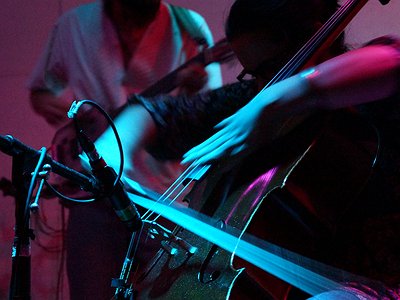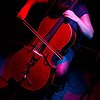Part 2
Derek Bailey defined improvising as the search for material which is endlessly transformable. Regardless of whether or not you agree with his perspective, what kind of materials have turned to be particularly transformable and stimulating for you?
Sound in itself is an endlessly explorable and transformable material. Imagination too.
Purportedly, John Stevens of the Spontaneous Music Ensemble had two basic rules to playing in his ensemble: (1) If you can't hear another musician, you're playing too loud, and (2) if the music you're producing doesn't regularly relate to what you're hearing others create, why be in the group. What's your perspective on this statement and how, more generally, does playing in a group compare to a solo situation?
Listening to the others is indispensable to play any type of music, yet it is very easy to stop listening. But, once you’re really inside a performance, it is nearly impossible to stop listening, too. Another rule is not to play at the same time as someone else, although in large ensembles, this inevitably occurs. But it’s interesting to try it in different situations. I like to have rules like that; at the end they’re shortcuts to create specific situations. Of course, when you play alone, the process is very different; it all comes from yourself.
With more and more musicians creating than ever and more, what does this mean for you as an artist in terms of originality? What are some of the areas where you currently see the greatest potential for originality and who are some of the artists and communities that you find inspiring in this regard?
There is a lot of music in the world based on just two or three chords, and it has been passed on like that through the generations; there’s nothing original about that, yet it has a very specific quality. The son huasteco musicians have a word, “gusto”, to name that which is original in each person who plays that music. It is something intangible, difficult to define, but it gives you goosebumps. It is all about the way a person can interpret such ancient songs.
What constitutes a good live performance in your opinion and what’s your approach to performing on stage? How do an improvisation and the recording of this improvisation compare?
This is a difficult question. I think a good gig happens when you connect with yourself, with the other musicians and with the audience. About recording, I like when improvisations are recorded; they do not compare to the energy of a live performance, but some times interesting things arise, and it’s also very useful to listen to yourself to learn from your mistakes.
Listening is also an active, rather than just a passive process. How do you see the role of the listener in the musical communication process?
It’s been said that a performance is not complete until the listener contributes its presence. It is an energy that comes out of the player, reaches the listener, and is sent back to the interpreter, transformed in a sort of stage life-force.
How do you see the relationship between music and other forms of art – painting, video art and cinema most importantly - and in how far, do you feel, does music relate to other senses than hearing alone?
Personally, I love to work with experimental theater and dance artists, especially butoh. It is one of the best settings I have found for my work. Finding people in different disciplines with similar approaches to mine – even though they work with their body or any other material – is remarkable. The chance of finding a common ground and resonating together is very special. But also, music is a completely synaesthetic experience, as it stimulates specific zones of the brain with some frequencies, so it’s not strange to have tactile or visual sensations.
Reaching audiences usually involves reaching out to the press and possibly working with a PR company. What's your perspective on the promo system? In which way do music journalism and PR companies change the way music is perceived by the public?
In the underground scene, I think no one is concerned about reaching large audiences. It may even be part of its charm. But of course, it is very healthy to have writers and journalists writing about scenes, and in general the fact that people talk about what we do. In more mainstream scenes, like classical music, where I also participate, whenever an interpreter becomes a commodity, it’s necessary for that artist to have a professional manager or promoter.
Do you have a musical vision that you haven't been able to realise for technical or financial reasons – or an idea of what music itself could be beyond its current form?
Sometimes, in order to carry out a vision, the limitations outweigh the possibilities. But you need to be able to work with what you have. Every year there are more budget cuts in the arts, when it should be the opposite. A lot has been said about youth and how children are our hope for the future, so it is very important to offer an arts education to them.






